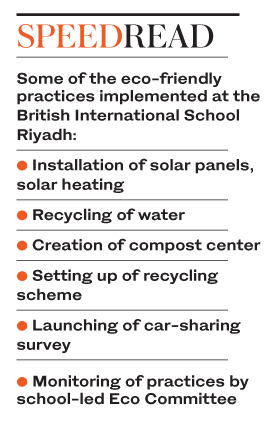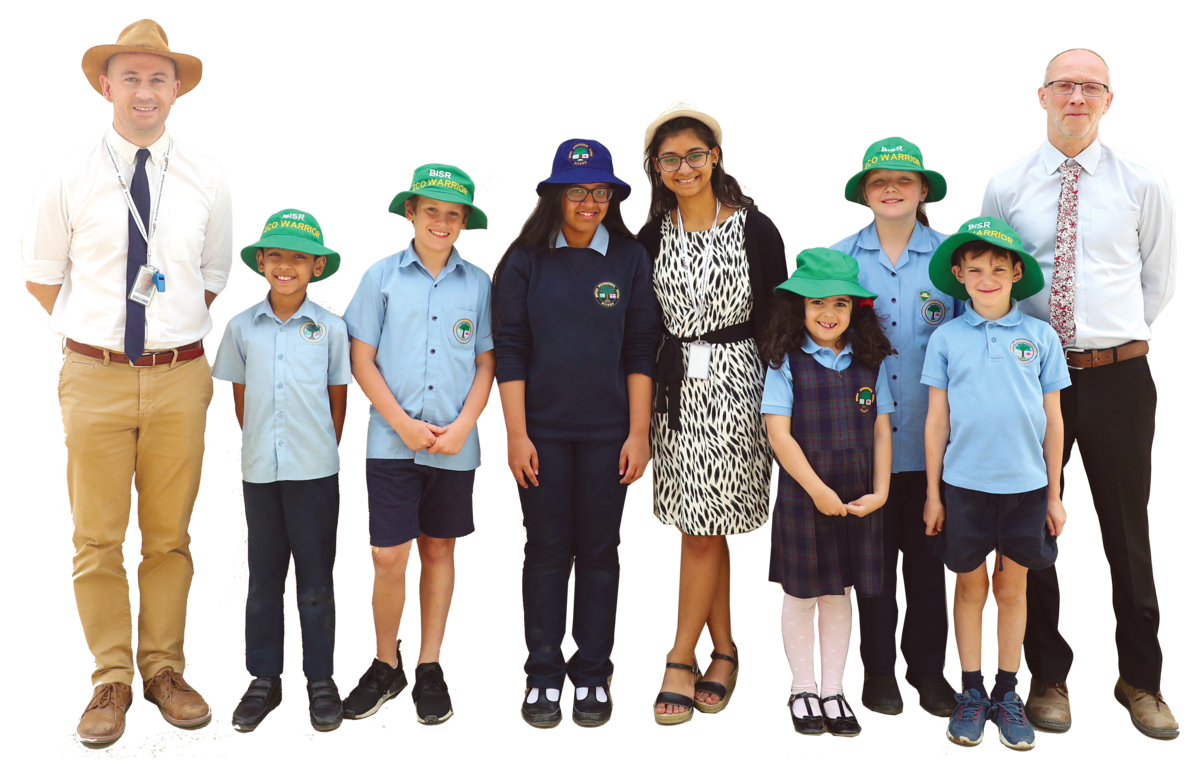ABU DHABI: From solar panels to recycling water, a Saudi school is instilling vital sustainability practices in its students from a young age.
The British International School Riyadh (BISR) uses the approach of an “integrated education for sustainability,” whereby students take part in the process of installing solar panels, solar heating and solar tubes.
They also recycle water, while the school has created a compost center for waste from the school kitchen and cooking class.
The savings from the project, namely bill reductions, are used to benefit two programs in poverty-stricken areas of Nepal.
The project is led entirely by students, including aspects of entrepreneurship and building vocational skills for the environmental sector.
 “Part of our school’s mission is challenging students to become conscientious global citizens and, in doing so, increase their awareness of environmental issues,” said Gareth Lupson, senior school Eco Committee coordinator at BISR.
“Part of our school’s mission is challenging students to become conscientious global citizens and, in doing so, increase their awareness of environmental issues,” said Gareth Lupson, senior school Eco Committee coordinator at BISR.
“We also expect our students to take responsibility for solving problems and to act on their compassion for the natural world,” he added. “As such, we’ve established a student-led committee that’s empowered to implement sustainability strategies, supported by a ring-fenced budget that students themselves are responsible for using.”
Last year, the initiative was awarded the Green Flag, an honor bestowed by the Foundation for Environmental Education upon schools that demonstrate a commitment to improving their environment and the wider community.
“One of our greater successes in recent years has been the installation of low-flow sink taps and toilets in bathrooms around the school, helping us to reduce our water usage and increase awareness of water conservation,” Lupson said. “We’ve also implemented strategies to reduce our electricity usage, and are looking to install solar-powered lights to illuminate areas of the school during hours of darkness.”
More recently, BISR successfully set up a recycling scheme, and it is now looking to create a recycling partnership with its neighboring Al-Hamra Oasis Village Compound. Its aim is to jointly recycle plastics, metals, cardboard and paper via Riyadh-based recycling companies, with the financial support of organizations associated with the school’s wider community.
“In the near future, we’re looking to expand our green spaces by distributing climate-tolerant plant beds around the school site for students to maintain,” Lupson said. “These will comprise a variety of suitable plant species, which will help nurture students’ understanding of and appreciation for biodiversity in the school grounds,” he added.
“We’ve also launched, this year, a car-sharing survey for all students to participate in, which may lead to fewer car journeys needed to transport students to and from school each day.”

Artwork made from plastic bottle tops and recycling bins created by BISR students. (AN photos by Bashir Saleh)
Lupson said one of the greatest challenges is being able to create a network of Riyadh-based organizations that can assist BISR in its efforts to become more sustainable.
“We’re always on the lookout for companies that might be interested in working with us as part of their corporate social responsibility, either by way of practical help or sponsorship,” he added.
“Fortunately, some of the companies that our parents work for have been very proactive, and we hope to foster more mutually beneficial partnerships in the future.”
Operating in a region where the climate requires a higher carbon footprint in order to supply water, control the temperature of classrooms and transport students to and from school was another impediment faced by the school.
“Similarly, there are challenges specific to this region associated with encouraging people to participate in recycling,” Lupson said. “But BISR is proud to take a leading role in addressing these challenges in the hope that it will inspire others to follow.”
The school was rightfully recognized for its efforts in sustainability. Earlier this year, a group of five Year 11 students came up with an innovative proposal to create sustainable energy sources for BISR. Their entry was chosen, as part of the Zayed Sustainability Prize, in the top 18 out of 2,101 worldwide entries.
During their trip to Abu Dhabi to attend the World Future Energy Summit, the students attended Sustainability Week events, shared ideas with young people from across the globe, and brought back valuable information on how BISR can continue to work toward an eco-friendly school environment.

Students and teachers at the British International School Riyadh (BISR).
“The fact that the Zayed Sustainability Prize brings together companies and students has given us an opportunity to connect with like-minded individuals, harvest inspiration and possibly build collaborations,” Lupson said.
“BISR has operated a student-led Eco Committee since before my arrival in 2016. There are in fact several sustainability projects rather than just one, as the students are working on several fronts including recycling, energy, water and biodiversity.”
The Eco Committee includes 46 primary and secondary students, ranging between 6 and 16 years old. They meet every week to touch base on the progress of their initiative, while taking care of the bins in the classrooms and making sure they are empty after classes.
They also monitor recycling practices inside the school, educate others about the recycling rules, and raise awareness among their peers about consumption of school resources.
“It massively decreased the usage of water and electricity in the school,” Lupson said. “The region has a large proportion of young people who are environmentally aware and understand the challenges of climate change and habitat degradation. It’s important that our institutions are seen to be acting on the environmental concerns held by those who’ll ultimately inherit the legacy we leave behind for them.”
He said in doing so, educational institutions and students alike must mitigate the causes of climate change and biodiversity loss, while adapting to the changing world that awaits them, so as to ensure an inhabitable region for future generations.
“We live in a finite world where infinite growth can’t be guaranteed,” he added. “By educating children to live within their means while conserving the planet’s resources, we can instil a responsible approach that will help maintain the delicate balance of our eco-systems and preserve the natural world upon which all humanity depends.”
Renewable energy holds a promising place in Saudi Arabia’s future. Earlier this year, the Renewable Energy Project Development Office (REPDO) of the Ministry of Energy, Industry and Mineral Resources expressed interest in seven solar photovoltaic (PV) projects.
These projects represent the next phase in Saudi Arabia’s ambitious renewable energy plans, which seek to achieve more than 25 gigawatts (GW) of wind and solar power generation in the next five years, and close to 60 GW over the next decade, of which 40 GW will be generated from solar energy and 16 GW from onshore wind.
According to REPDO, the seven projects, located in Qurayyat, Madinah, Rafha, Al-Faisaliah, Rabigh, Jeddah and Mahd Al-Dahab, will supply enough energy to power 226,500 households and create more than 4,500 jobs during construction, operation and maintenance.
The Kingdom aims to create over the next decade a global hub of renewable energy capability, spanning local manufacturing to project development, domestically and abroad.

































